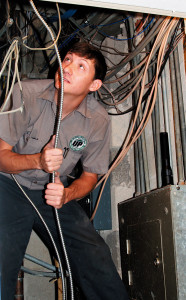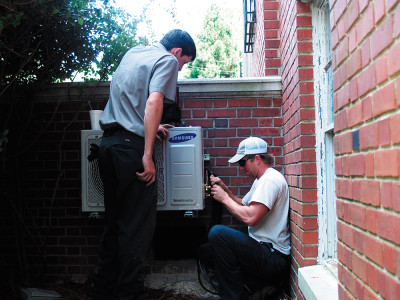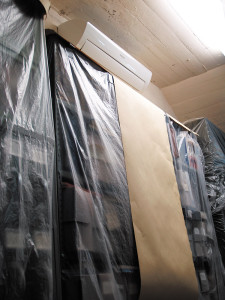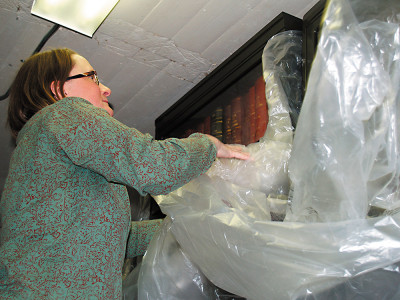By Mary Woodward
JACKSON – The diocesan archives is getting a new climate control system to assist in maintaining the historical documents and artifacts it houses. The vault where the archives has been stored since Bishop Richard Gerow brought the historical records from Natchez to Jackson in the late 1940s is located on the ground floor of the diocesan chancery

William Johnson of Upchurch pulls wire as part of the installation process for the Archives’ new climate system. (Photo by Mary Woodward)
office in Downtown Jackson. The vault has never had its own climate system and depended upon the overall building system to keep it regulated.
Archives should be kept at a constant temperature and dryness. The ideal for archive preservation, according to Forrest Galey of the Mississippi State Department of Archives and History, is a constant temperature of 60 degrees and 40 percent humidity.
“The most important condition for archive preservation is providing a stable environment,” Galey said. “Humidity is the enemy of paper and other artifacts. Mold will grow very quickly on paper in a humid environment,” she added.
A new HVAC system based on zones was installed in the chancery office building by Upchurch Services Company. Due to structural and mechanical issues, the archives was not able to be zoned. Therefore, a smaller system, which cools and dehumidifies was added in the vault itself. Moisture is drained into a front flower bed. The entire archives had to be covered to protect it from the dust created by drilling through 10 inches of concrete.

William Johnson (left) and Jeffery Williams of Upchurch Services install the new inverter and drain for the diocesan archives’ climate control system. (Photo by Mary Woodward)
Now the system will be monitored in order to maintain a constant and stable environment for diocesan historical and sacramental records. The diocesan archives holds original documents dating to the 1790s when the Spanish governed Natchez and its surroundings. These sacramental records written in Spanish and signed by early pioneer clergy from Ireland are maintained in the vault along with microfilm records of all the parishes from the beginnings of the diocese.
Parishes keep the actual registers on site, but the diocese microfilms these books every 10 years for long term records management. Because of TV shows such as “Who Do You Think You Are?,” the archives has seen a growing interest in genaeolgical research.
The diocesan archives retains a professional researcher to assist those seeking their ancestors through these records. Dr. William Ashley Vaughan is available to trace family histories back to the late 18th century. These requests must be submitted in writing and are processed as they come. Dr. Vaughan charges a fee for his time.

The new dehumidifier/cooling equipment sits above a section of the diocesan archives. The entire archives was covered while the equipment was installed. (Photo by Mary Woodward)
Because the archives functions mainly as records retention for the church, the archives is open only to researchers working on doctoral dissertations, masters theses and various historical projects. Our biggest research topics are for the church in the Civil War and the Civil Rights Movement. From this one is able to see the broad spectrum of materials in the archives.
We recently hosted a young man from the National University of Ireland in Galway who was writing his dissertation on antebellum Irish immigration in the dioceses of Charleston and New Orleans. He spent three days pouring over original documents and correspondence from Bishop William Henry Elder’s papers.
Again, all research requests must be submitted in writing with a basic outline of materials sought. It often takes several months to complete requests.

Diocesan director of archives, Mary Woodward, removes plastic sheeting used to cover the archives during the installation of a new climate control system. (Photo by Contyna McNealy)
If you are seeking your own sacramental records or more recent ones, please contact the parish where you were baptized or married. It is much easier for them to get you a copy than for us to do that. Due to privacy issues and identity theft please be prepared to provide identification in order to receive records.
For genaeology or for historical research send all requests to: Diocesan Archives, P.O. Box 2248, Jackson, MS 39225-2248; or email to chancery@jacksondiocese.org. Requests should include contact information with telephone, mailing address, and email.
